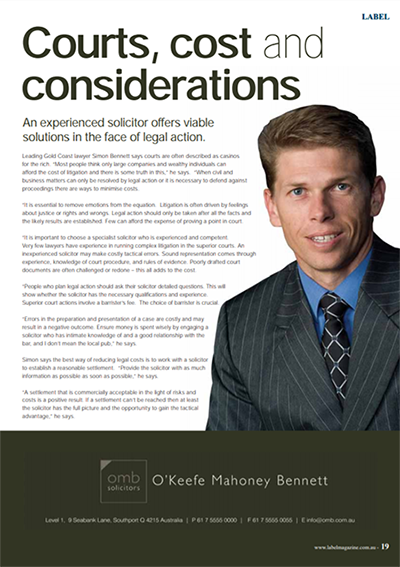
There’s no doubt about it. Ending a relationship is never easy. But in Australia, ending a marriage is relatively simple – at least in the eyes of the law. This is because, unlike the divorce process in the United States, divorce in Australia doesn’t address some of the most emotionally volatile issues such as child custody, child support, spousal maintenance and the division of marital assets in detail. In fact, the only issues addressed when you apply for divorce here are whether you are legally eligible to do so and whether or not you’ve followed all of the applicable rules.
To be eligible to file for divorce in Australia, the only requirement in most cases is that you and your spouse have separated for one year. The only exception to this rule is if you are filing for divorce less than two years after you got married (inclusive of the time when you were separated). In such cases, you must see a court-approved counsellor with your spouse and file a signed counselling certificate with the court upon completion. If you and your spouse are unable to fulfil this requirement for any reason, you must ask the court’s permission to get divorced.
If you were married abroad, you may still apply for divorce here if you or your spouse:
- Regard Australia as your home and intend to live indefinitely in Australia and are an Australian citizen or resident, or
- Are an Australia citizen by birth or descent
- Are an Australia citizen by grant of Australian citizenship
- Ordinarily live in Australia and have done so for 12 months immediately prior to filing for divorce
If you meet one of these criteria, you can go ahead and prepare your application for divorce. If you aren’t comfortable filling it out yourself, you can also do so with help from a lawyer. If you choose to consult a lawyer, be sure to bring the following to your appointment:
- Marriage certificate
- Identification
- Information about any children under the age of 18
- Any current or pervious orders associated with family law
Once you’ve completed the application you and/or your spouse must sign it so it can be filed with the appropriate court (along with any other applicable documents), and a hearing can be scheduled. If only one of you does so, it is considered an individual application, and if you both do so, it is considered a joint application. This is an important distinction, because it determines who must do what from now on.
For example, if you filed an individual application, you must serve a copy of the copy on your spouse. You must also file two documents related to the service with the court. The first of these is called an Affidavit of Service, and the second is the Acknowledgement of Service (when required).
Furthermore, if you file an individual application and you and your spouse have children age 17 or younger, you must attend the hearing. However, you need not do so in person, as long as you seek permission to participate by telephone. If need be, you can also attend at the relevant court registry. In this case, you must still serve the application on your spouse and file the paperwork specified in the previous paragraph.
Finally, even if you file an individual application, your spouse has the right to file a response seeking changes to the application if he or she disputes any of the details, or if he or she simply opposes the application. Another thing to keep in mind is that even if your spouse pursues this option, he or she is not required to attend the hearing.
At the hearing, you will be asked about the application, and if you have minor children, the judge will also ask questions to ensure that they will have a chance to spend time with you and your spouse. If all of these questions are answered to his or her satisfaction an order will be granted accordingly.
On the other hand, if you file a joint application, the ensuing process is much easier. This is because neither one of you will be required to attend the hearing, whether you have any minor children or not. This also eliminates the need to serve the application on your spouse or file related documents with the court.
In either case, the divorce order will take effect, or become “final,” one month and one day after the hearing. At this point, the court will send a copy to each of you, and you’ll no longer be legally married.
Conversely, failing to take any of these steps can result in denial of your application. If this happens, the court will usually give you time to correct any deficiencies prior to another hearing. If you need help correcting a mistake that resulted in the denial of your initial application or to lessen the chances that your divorce application will be rejected due to a technicality, contact our Gold Coast Family Lawyers at OMB Solicitors today.






















